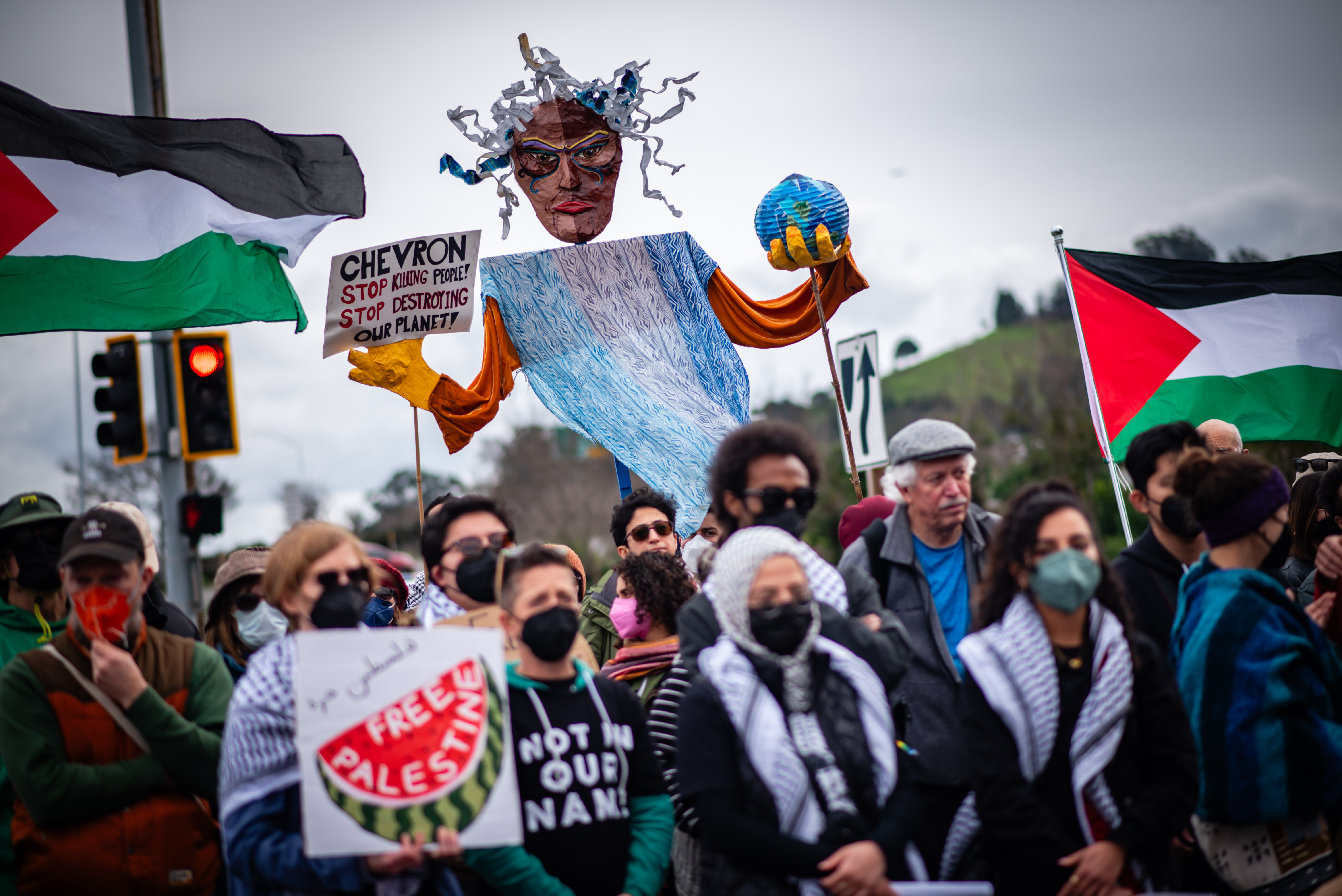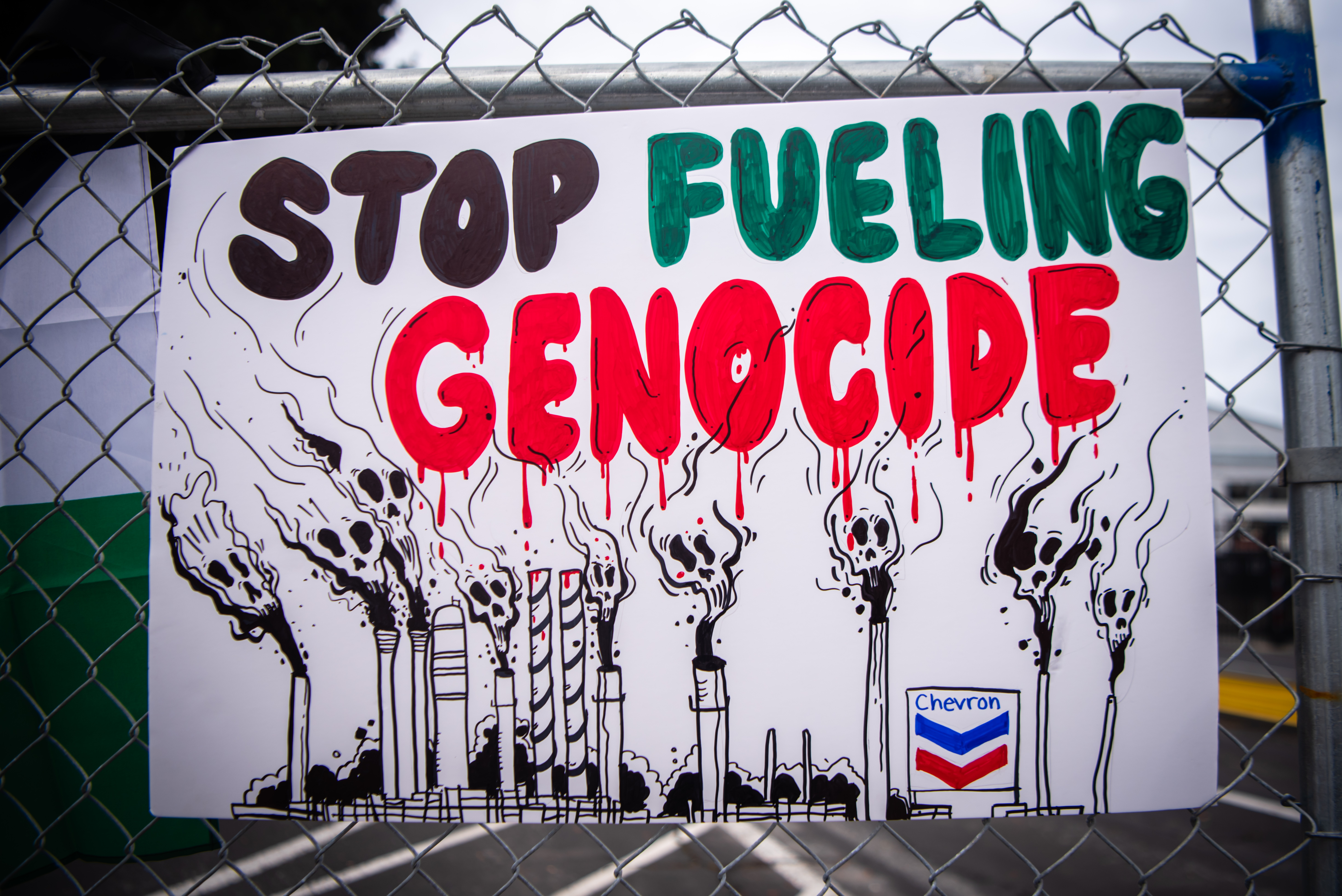Fact Sheet: Chevron Fuels Israeli Apartheid and War Crimes
Written by the Action Center for Corporate Accountability, January 2025, for the Boycott Chevron campaign.

Photo by Brooke Anderson
Chevron’s business activities in Palestine/Israel
Chevron is the largest producer of natural gas for Israel and the largest multinational corporation with a significant stake in Israel's energy sector.
It operates and partially owns the largest active Israeli gas fields, Tamar and Leviathan, and the smaller and undeveloped Dalit field, all of which are located in the Eastern Mediterranean Sea, west of Haifa. The gas from Tamar is processed in a rig that is located farther south, off the coast of Isdud/Ashdod.
In 2023, Chevron made an estimated $1.5 billion in revenue from Tamar and Leviathan gas sales alone, mostly from exports to Egypt and Jordan.
Chevron partially owns the Mari B gas field off the coast of the Gaza Strip, but it has been depleted and inactive since 2013.
Chevron also operates and partially owns the East Mediterranean Gas (EMG) pipeline, which runs from Israel to Egypt off the coast of the Gaza Strip.
As the operator of these gas fields and the pipeline, Chevron is in charge of all operations of these projects, including planning, construction, production, and supply.
The Caspian Pipeline Consortium in Russia, which supplies crude oil to Israel, and the main Kazakh companies that supply this oil, are also partially owned by Chevron.
Between 2021 and December 2024, Chevron spent nearly $28.5 million on lobbying the U.S. government, including on energy issues related to Israel.
Chevron entered the Israeli fossil gas market in 2020 with the acquisition of Noble Energy; it can choose to sell off this investment at any time.
Chevron fuels Israeli apartheid, military occupation, and settler colonialism
Chevron is a major economic partner of the Israeli government:
Israel collects hundreds of millions of dollars every year in royalties and fees from Chevron extraction projects. In 2023, this amounted to over $820 million, above and beyond other regular corporate taxes.
Israel's energy production relies on the supply of fossil gas. About 71% of the electricity produced in 2023 used fossil gas, and two-thirds of it was supplied by Chevron's Tamar gas field. Tamar holds the main supply contract to the state-owned Israel Electric Corporation through 2030.
Chevron fuels apartheid and war crimes:
The Israel Electric Corporation supplies electricity to all branches of the Israeli government and the vast majority of Israeli households. This means that all Israeli military bases, prisons, and police stations, as well as Israel’s illegal settlements and outposts in the occupied West Bank, rely on Chevron.
The supply of electricity across Israel and the occupied Palestinian territory is used as a tool of subjugation, collective punishment, annexation, and dispossession. In the occupied Palestinian territory, the Israel Electric Corporation took over the Palestinian power grid after Israel’s 1967 occupation, making the Palestinian population dependent on its services.
As part of Israel’s apartheid regime, some Palestinian communities inside Israel and across the occupied Palestinian territory are banned from connection to the grid; some are provided subpar services; some are charged differently than neighboring Jewish-Israeli towns; and many suffer punitive power cuts as a form of collective punishment. This is energy apartheid.
Specifically, Chevron has fueled and exploited the Israeli military occupation of Gaza:
Since 2007, Israel has imposed an air, land, and naval blockade of Gaza. Israel tightened its blockade to enable Chevron’s operations off the coast of Gaza.
Chevron’s Tamar processing rig, as well as its pipelines, are located about 13.5 nautical miles offshore near al-Majdal Asqalan/Ashkelon, just outside the territorial waters of Gaza. The Israeli Navy secured this rig—and the nearby EMG pipeline—by restricting all Palestinian maritime activities in the area. Since 2009, this has tightened Israel’s naval blockade on the Gaza Strip to 3–6 nautical miles, with devastating impacts on Gaza’s economy and fishing industry.
The EMG pipeline, also operated and partially owned by Chevron, connects Israel and Egypt, passing west of the Gaza shoreline. Regardless of its exact location—kept secret for security reasons—this pipeline is not under Israeli jurisdiction, and any economic gain in this area without Palestinian agreement is illegal under international law.
Since 2007, Israel has repeatedly destroyed civilian energy infrastructure, including Gaza’s one power plant, making the Israel Electric Corporation an indispensable supplier, providing about 30–50% of Gaza’s electricity, paid for by the Palestinian Authority. Israel frequently reduced or shut off supply as a form of collective punishment, in violation of international law. After Oct. 7, 2023, electricity supply to Gaza was completely shut off.
Chevron fuels the destruction of our planet and communities
Chevron fuels environmental destruction:
Chevron is one of the world’s largest fossil fuel companies, fueling the climate crisis worldwide. It ranks first for most cumulative climate pollution in history among all investor-owned fossil fuel companies.
Chevron is responsible for major instances of climate destruction in California. In 2021, the company's Richmond refinery spilled 600 gallons of oil into the San Francisco Bay.
Chevron deliberately dumped 16 billion gallons of toxic wastewater into Ecuador’s Amazon Rainforest between 1964 and 1992, in what is considered the world’s largest oil-related catastrophe. It has yet to clean up this wastewater.
Chevron polluted the Niger Delta, decimating the region’s ecosystem and devastating indigenous groups’ waterways, food systems, and livelihoods. The company has yet to clean up this pollution.
Chevron's activities disproportionately impact communities of color with pollution and severe human health risks. The company has faced several lawsuits, including in Delaware, Oakland and San Francisco, Calif., Hoboken, N.J., and Washington, D.C., alleging that the impacts of its operations have disproportionately affected marginalized communities.
Chevron fuels violence against indigenous communities:
Chevron has repeatedly been sued for violence against indigenous communities around the world. In 2021, an independent analysis of 70 lawsuits against the company found that 65% of cases involved documented claims of severe human rights abuses, including torture, forced labor/slavery, rape, murder, and genocide.
Between 2005 and 2024, Chevron was one of the owners of the Yadana gas project in Myanmar. Revenue from the project reportedly funded atrocities against the people of Myanmar. After the 2021 military coup and military attacks on Myanmar’s ethnic communities and resistance actors, Chevron lobbied the U.S. government not to impose sanctions on Myanmar. In 2022, Chevron announced it would exit the country, and it did so in 2024.
Chevron’s construction of a pipeline from Chad to Cameroon on indigenous lands from 2000–2003 displaced some 22,000 indigenous persons through the contamination of their water sources and soil and the destruction of their food sources. Protests against this land destruction led to violent conflict.
Beginning in the 1980s, Chevron’s activities in Nigeria have led to the destruction of ancestral lands and the forcible displacement of multiple indigenous communities. In several documented incidents, Chevron-paid military forces destroyed indigenous communities’ homes and infrastructure to clear lands for pipelines and executed indigenous rights activists.
The company’s activities have played a role in the destruction of marginalized people’s homes, resources, and livelihoods in Azerbaijan, Angola, Argentina, Canada, China, East Timor, Ecuador, Ghana, Indonesia, Kazakhstan, Poland, Thailand, Venezuela, the U.S., and other countries.
The impacts of the 2023–2025 war in the Middle East
Chevron faces significant ongoing risks to its operations in the region due to the ongoing violent conflict. These risks include emergency shutdowns, barriers to developing and expanding operations, difficulties sourcing maintenance workers, and persistent uncertainty among clients and investors.
Chevron has repeatedly shut down its operations in Israel from 2023–2024. In October 2023, Chevron shut down production at the Tamar processing rig and its gas exports through the EMG pipeline for almost six weeks due to increased security risks. Several more emergency shutdowns were recorded at both Leviathan and Tamar in October and November 2024. The company called these shutdowns precautionary measures, citing security concerns—such as missile or drone attacks—that could threaten the safety of its employees, the public, the environment, and its facilities.
These shutdowns had an impact on gas exports to Egypt, cutting Chevron’s revenues in 2023 and resulting in power outages in Egypt. Reportedly, Egyptian officials started looking for alternative supply sources, creating risks for Chevron’s future revenues.
All expansion plans to the gas fields, rigs, and pipelines were halted and postponed after October 2023, including a planned expansion to Leviathan’s production capacity, a plan to build a new pipeline to Egypt, and further development of the Tamar gas field.
From 2023–2024, Chevron repeatedly reported to its investors that the ongoing war may threaten its revenues. Amid increasing uncertainty, the company has reported that the “future impacts” of the war on its operations and financial condition “remain uncertain."
Good to know: more about natural gas in Palestine/Israel
Chevron’s gas projects in Palestine/Israel gain the most revenue from exports to Jordan and Egypt. Exports to Egypt increased by almost 40% in 2023, making up to 14% of Egyptian consumption, while exports to Jordan supplied over 80% of Jordan’s gas needs for energy production.
Israel has prevented the development of the Palestinian Gaza Marine gas field since its discovery in 2000 about 19.4 nautical miles off the coast of Gaza. In June 2023, Israel announced that it would begin developing the field in cooperation with Egypt and the Palestinian Authority. The field is owned by CC Oil & Gas of the Consolidated Contractors Co. and the Palestinian Investment Fund. Chevron is not involved in this project.
About one-third of Israel’s gas needs as of 2023 is extracted from the newly developed Karish gas field, operated by Greek-British firm Energean Oil and Gas. This company also owns the Israeli Karish North, Tanin, and Katlan gas fields and is the second-largest multinational player in Israel’s energy sector after Chevron.
Other non-Israeli companies with a large stake in the Israeli energy sector, through their minority stakes in the Tamar gas field, include the Abu Dhabi state-owned company Mubadala Petroleum and the State Oil Company of the Republic of Azerbaijan (SOCAR).
In October 2023, following the onset of the Gaza genocide, Israel granted new gas exploration permits, including to the Italian company Eni, U.K. companies BP and Dana Petroleum, and SOCAR. These permits were contested by Palestinian human rights organizations, as they include areas inside Palestinian maritime territory. In March 2025, Israel granted new gas exploration permits to BP, SOCAR, and Israeli company NewMed, aimed at boosting domestic gas reserves and exports.
More Resources
Powering injustice: Exploring the legal consequences for states and corporations involved in supplying energy to Israel, a report by SOMO, December 2024
Israel’s crude and fuel supply chains, a report by Data Desk and Oil Change International, March 2024
Beneath troubled waters: Noble Energy’s exploitation of natural gas in the Eastern Mediterranean Sea, a report by Dutch research center SOMO, May 2017
Annexing Energy: Exploiting and Preventing the Development Of Oil and Gas in the Occupied Palestinian Territory, a report by Palestinian human rights organization Al Haq, August 2015
Chevron’s Environmental Crimes: 13 Years of Evasion and Escalation, Amazon Watch blog post, February 2024
Chevron’s Global Destruction: Ecocide, Genocide, and Corruption, a report by Nan M. Greer, PhD, October 2021
Join the Boycott Chevron campaign
Get resources to support your activism.

Photo by Brooke Anderson